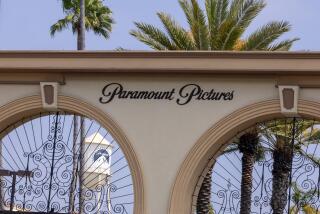Dissidents Claim Victory in Battle for Oak Industries
SAN DIEGO — A group that includes former Securities and Exchange Commission Chairman Roderick M. Hills and former U.S. Atty. Gen. Elliot L. Richardson claimed an “overwhelming” victory Tuesday in a bitter fight for control of Oak Industries.
However, Oak Chairman E. L. McNeely steadfastly maintained at the company’s annual meeting here that it will be at least a week before a vote count is available because of a possible court challenge.
In addition to Hills and Richardson, the dissident slate seeking election to the board includes San Diego businessman Daniel W. Derbes, San Diego Economic Development Corp. Chairman George Leisz and Gilbert Mathews, a senior managing director of Bear, Stearns & Co., a New York-based investment banking firm.
Hills, who joined Oak’s board in 1985 at McNeely’s request, began the proxy fight in March after learning that he would not be renominated for a second term. Last week his effort gained momentum when he won the support of Oak’s largest shareholder, a British firm with 25% of Oak’s common stock.
During Tuesday’s meeting, Hills argued that Oak will not generate operating profits unless McNeely, 70, is replaced with an executive who has more manufacturing experience. Oak owns several operating companies, including a number that make electronics components.
The meeting, which was held before an overflow crowd of about 300 shareholders, included charges and countercharges by Hills and McNeely, two businessmen who have known each other for a dozen years. Shareholders remained largely silent during the meeting, although several applauded when Hills’ group indicated that McNeely should step aside.
McNeely said Oak will contest the board vote because of what he alleged were multiple securities laws violations during the proxy battle by Hills’ group and London-based MIM Ltd., which voted its 25% Oak stock block in favor of Hills’ slate.
Both the Hills group and Oak threatened to subject the vote to separate legal challenges. MIM already has asked a judge in Delaware to prohibit Oak from disallowing MIM’s vote.
MIM Chairman David Stevens was clearly upset by the tone and substance of Oak’s meeting, telling shareholders that Oak had incorrectly listed his name and occupation in its proxy statement, and that the mistakes were “symptomatic of the way the board has treated its largest shareholder. . . . This is not the way to run a business, and in my view it’s time for a change.”
Stevens complained that it was “totally absurd” for Oak to challenge his company’s right to freely vote its shares. Stevens, who delivered an impromptu and impassioned defense of MIM’s corporate track record, said he never expected the meeting to “degenerate” to the point where opponents were hurling charges and counter-charges.
Shortly after Tuesday’s meeting, Hills defended his group against McNeely’s allegations. “Believe me, we did not break any SEC rules” during the proxy fight, said Hills, who was chairman of the SEC under President Gerald R. Ford.
McNeely, who defended his record at Oak, won support during the meeting from current Oak Director James Watkins, who credited McNeely with “putting this company back on an even keel.”
McNeely asked shareholders to be patient with Oak’s still-troubled operating units because “this company was snatched from the jaws of death” and it would take longer to return them to profitability.
While McNeely credited his management team with rescuing Oak from likely bankruptcy, he told shareholders that he didn’t “expect any acknowledgment, applause or appreciation for that.”
Hills downplayed the likelihood of a court challenge by Oak. “The good sense and good manners of the present board of Oak will yield to what has been an overwhelming shareholder vote for our slate,” said Hills, who claimed a 2-1 victory margin based on proxies collected prior to the meeting.
Hills predicted that Oak will not pursue “a silly and foolish court battle” because its shareholders have expressed strong disenchantment with the current board. Hills maintained that his group won the proxy contest by a 2-1 margin, based on proxies that were collected before the meeting began.
Richardson, who was attorney general under President Richard M. Nixon, suggested that with the new board in place, Oak would be headed toward “growth and profitability.”
Derbes, a member of Hills’ board slate, described the vote as an “overwhelming defeat” for McNeely’s board slate. “Clearly the shareholders have spoken, and they’ve lost the mandate to continue to govern the company,” Derbes said.
Oak has claimed that MIM, which in January acquired its Oak shares from Santa Clara-based Itel, violated terms of an agreement that prohibited the British company from taking an active role in a proxy fight. Stevens maintained that his company has “never been in concert” with Hills’ group.
Hills told shareholders that McNeely deserved credit for a turn-around at Oak, a high-flying media conglomerate that, before McNeely took over in 1985, generated $300 million in net losses. Industry analysts have credited McNeely with dumping Oak’s unprofitable businesses and trimming back its debt. The company has reported net profits in recent quarters but its various divisions have yet to report consistent operating profits.
“I deeply regret the fact that our subsequent and deepening differences have caused a breach in a personal relationship that I cherish,” Hills said.
Oak’s stock, which has traded at about $1 for the past two years, closed up $.125 at $1.625 on Tuesday.
More to Read
Inside the business of entertainment
The Wide Shot brings you news, analysis and insights on everything from streaming wars to production — and what it all means for the future.
You may occasionally receive promotional content from the Los Angeles Times.










